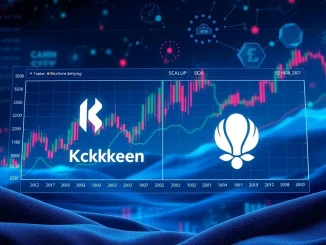
In the dynamic world of investments, strategic capital allocation is paramount. While the cryptocurrency market often grabs headlines with its rapid swings, the principles of maximizing shareholder value and optimizing asset portfolios are universal. Today, we’re taking a deep dive into how a major player in the real estate investment trust (REIT) sector, Sun Communities (SUI), executed a masterclass in capital management through special dividends, offering valuable insights that resonate across all investment landscapes, even for those keenly following digital assets.
Understanding Sun Communities’ Bold Capital Return Strategy
Sun Communities, Inc. (SUI), a titan in the manufactured home (MH) and RV community space, recently made a significant strategic move that sent ripples through the REIT sector. Following the substantial $5.25 billion sale of its Safe Harbor Marinas portfolio in early 2025, SUI embarked on a bold capital return strategy. This wasn’t just about shedding assets; it was a calculated maneuver to sharpen its focus and directly reward its investors.
The cornerstone of this strategy was the distribution of a hefty $4.00 per share special dividend, totaling an impressive $520 million. This move clearly signaled SUI’s commitment to unlocking immediate value for its shareholders. But the special dividend was just one piece of a larger, well-orchestrated plan. It was complemented by:
- A robust 10.6% increase in its regular quarterly dividend, signaling sustained confidence in its core operations.
- A substantial $1.0 billion stock repurchase program, further demonstrating management’s belief in the intrinsic value of SUI’s shares.
This multi-pronged approach positions SUI as a compelling case study in disciplined capital allocation, providing a blueprint for how companies can adapt and thrive by prioritizing their core strengths and directly benefiting their ownership base.
Why Special Dividends? The Strategic Rationale for Enhancing Shareholder Value
The decision to issue special dividends wasn’t a spontaneous act; it was rooted in a clear strategic rationale aimed at maximizing shareholder value. The sale of the marina portfolio was more than just a liquidity event; it was a deliberate pivot. The marina business, while valuable, exposed SUI to more volatile income streams tied to services, retail, and entertainment. By divesting, SUI could refocus on its foundational strengths: manufactured housing and RV communities, which offer more predictable, recurring revenue.
This strategic realignment brings several key benefits:
- Focus on Core Competencies: Manufactured housing and RV communities provide stable, high-demand housing solutions, aligning with SUI’s long-term vision.
- Reduced Volatility: Shifting away from the more cyclical marina business enhances the predictability of SUI’s earnings.
- Direct Return of Capital: The special dividend immediately puts proceeds from the sale back into shareholders’ pockets, bypassing the need for protracted reinvestment in non-core assets. This is particularly appealing in an economic climate marked by inflation and uncertainty, where investors prioritize tangible, near-term returns over speculative growth.
- Responsiveness to Investor Demands: In the broader REIT sector, there’s a growing trend of activist investors advocating for aggressive capital return strategies. SUI’s proactive move demonstrates responsiveness and a commitment to investor interests.
By leveraging the sale proceeds to both reduce leverage and return capital, SUI effectively demonstrated a disciplined approach to capital management, setting a precedent for other companies contemplating similar portfolio optimizations.
Balancing Immediate Gains with Long-Term Resilience: SUI’s Financial Fortification
While the $4.00 per share special dividend offered immediate gains, SUI’s strategy was far from short-sighted. The company meticulously balanced short-term shareholder returns with long-term strategic resilience. A significant portion of the sale proceeds was allocated to fortify SUI’s financial position and ensure future growth:
- Strategic Reinvestment: SUI earmarked $1.0 billion for 1031 exchange accounts. For those unfamiliar, a 1031 exchange allows investors to defer capital gains taxes on the exchange of like-kind properties, enabling SUI to reinvest efficiently in high-growth MH and RV assets without immediate tax burdens. This ensures a continuous pipeline for strategic acquisitions within its core segments.
- Aggressive Debt Reduction: A staggering $3.29 billion was allocated to debt reduction, covering credit facility paydowns, secured debt, and senior notes. This significant deleveraging bolstered SUI’s balance sheet, bringing its net debt-to-EBITDA ratio down to a manageable 2.5x–3.0x range.
This financial flexibility is crucial for a REIT operating in an interest-rate-sensitive environment. By reducing its debt burden, SUI has positioned itself to:
- Withstand potential economic headwinds in 2025 and beyond.
- Maintain robust capacity for future reinvestment in high-quality, yield-generating assets.
Evidence of SUI’s operational strength in its core segments is clear: its North American Same Property Net Operating Income (NOI) grew 4.6% year-over-year in Q1 2025. This was significantly driven by an impressive 8.9% NOI growth in the manufactured housing segment, which continues to be a cornerstone of the company’s robust business model.
Investor Perceptions and the Dynamic REIT Sector Landscape
How did the market react to SUI‘s bold moves? In the REIT sector, special dividends often evoke mixed reactions. They are celebrated for immediate value creation but can sometimes raise questions about a company’s long-term growth prospects if they signal a lack of reinvestment opportunities. In SUI’s case, the market largely viewed the special dividend as a neutral to positive event.
Analysts underscored that the payout represented a return of capital, not a fundamental shift in the company’s core earnings power. SUI’s updated 2025 guidance, projecting Core Funds From Operations (FFO) per share of $6.43–$6.63 and North American Same Property NOI growth of 3.5%–5.2%, reinforced this perspective, suggesting continued operational strength despite the portfolio adjustment.
Historical data offers further insights into market sentiment. A backtest of SUI’s dividend announcements from 2022 to the present reveals a pattern of positive market reactions:
| Timeframe After Dividend Announcement | Win Rate (Stock Price Increase) |
|---|---|
| 3 Days | 77.78% |
| 10 Days | 66.67% |
| 30 Days | 55.56% |
This suggests that the market often rewards SUI’s consistent capital return strategy. However, it’s important to note that market volatility can temporarily override short-term optimism, as evidenced by a -1.06% decline on June 3, 2024. Despite this, SUI has consistently maintained a premium valuation, with a price-to-FFO multiple of 23x as of July 2025, significantly higher than the REIT sector average of 18x. This premium is justified by its strong operational performance, particularly in the MH segment, and its proactive approach to capital management. Major brokerage firms have reiterated an “Outperform” rating, with an average price target of $137.44, indicating a potential 9.92% upside from its current price of $125.03.
Navigating Risks and Maximizing Shareholder Value
While SUI’s strategy has been largely successful, it’s crucial for investors to consider potential risks and challenges. Critics argue that exiting the marina business might limit SUI’s revenue diversification, especially as the RV segment faces its own cyclical challenges. The RV segment’s NOI, for instance, declined 9.1% in Q1 2025, highlighting its sensitivity to broader macroeconomic trends like interest rates and consumer discretionary spending.
However, SUI’s management has been clear about its strategy in the RV space: they remain selectively opportunistic, prioritizing high-demand locations and exiting weaker markets. This targeted approach aims to mitigate the cyclical risks while still capitalizing on growth opportunities.
Another point of consideration is valuation. The GuruFocus (GF) Value model projects a potential 21.29% downside for SUI’s stock, suggesting that some investors might view the current valuation as stretched. This divergence in valuation perspectives underscores the importance of diversification within REIT portfolios. Sector-specific risks, whether from economic downturns impacting consumer travel or interest rate hikes affecting property values, can amplify volatility. Therefore, while SUI presents a compelling case, a balanced portfolio approach remains key.
Strategic Implications for Astute REIT Investors
Sun Communities‘ strategic maneuvers offer invaluable lessons for investors navigating the REIT sector in 2025 and beyond. Firstly, it powerfully demonstrates the importance of aligning capital allocation with core competencies. By shedding the marina business and doubling down on its expertise in MH and RV communities, SUI has simplified its operational model, enhanced predictability, and reinforced its market leadership.
Secondly, SUI exemplifies how special dividends can serve as a vital bridge between short-term liquidity and long-term strategic reinvestment. In sectors with clear growth drivers, returning excess capital through dividends, while simultaneously planning for future acquisitions and debt reduction, showcases a mature and investor-centric approach to capital management.
For income-focused investors, SUI’s profile is particularly attractive. The 10.6% dividend increase to $1.04 per share, coupled with its remarkable 30-year track record of never cutting the dividend, makes it a reliable income generator. The ongoing $1.0 billion stock repurchase program further signals management’s confidence in the company’s intrinsic value, providing additional support for its share price.
Conclusion: SUI’s Blueprint for Proactive Value Unlocking
Sun Communities’ adept use of special dividends following its marina sale stands as a prime example of a strategic and disciplined approach to shareholder value creation. By orchestrating a one-time payout while simultaneously preserving financial flexibility for future growth and debt reduction, SUI has masterfully balanced the immediate demands for returns with the imperative of long-term resilience. For investors, this case study underscores a critical lesson: evaluating REITs goes beyond merely assessing their current yield. It demands a deeper understanding of their ability to adapt capital strategies to evolving market conditions, optimize portfolios, and consistently deliver value. In a sector where robust governance and transparent capital allocation increasingly dictate performance, SUI’s actions position it as a leading model for proactive value unlocking in the post-2025 landscape.
Frequently Asked Questions (FAQs)
Q1: What is a special dividend, and how does SUI’s special dividend benefit shareholders?
A special dividend is a one-time dividend payment made by a company to its shareholders, usually from a significant, non-recurring event like an asset sale. SUI’s $4.00 per share special dividend directly returned $520 million to shareholders, providing an immediate boost to their returns and demonstrating the company’s commitment to sharing the proceeds of its marina portfolio sale.
Q2: Why did Sun Communities sell its Safe Harbor Marinas portfolio?
Sun Communities sold its Safe Harbor Marinas portfolio to refocus its business on its core strengths: manufactured housing (MH) and RV communities. These segments offer more predictable and recurring revenue streams compared to the marina business, which exposed the company to more volatile service, retail, and entertainment income. The sale allowed SUI to streamline its operations and enhance financial stability.
Q3: How does SUI’s debt reduction impact its financial health?
SUI’s significant debt reduction of $3.29 billion (covering various debt types) has substantially strengthened its balance sheet. By reducing its net debt-to-EBITDA ratio to a manageable 2.5x–3.0x, SUI has gained greater financial flexibility, reduced its exposure to interest rate fluctuations, and improved its capacity to withstand economic headwinds while still having capital for future strategic investments.
Q4: What are 1031 exchange accounts, and why are they important for SUI?
1031 exchange accounts refer to Section 1031 of the U.S. Internal Revenue Code, which allows investors to defer capital gains taxes when exchanging one investment property for another of a similar nature. SUI allocated $1.0 billion to these accounts for future acquisitions in its core MH and RV segments. This strategy enables SUI to efficiently reinvest sale proceeds into high-growth assets without incurring immediate tax liabilities, fostering continuous portfolio expansion.
Q5: Is SUI a good investment for income-focused investors?
For income-focused investors, SUI presents an attractive option. The company recently increased its regular quarterly dividend by 10.6% to $1.04 per share and boasts an impressive 30-year track record of never cutting its dividend. This consistent dividend growth, combined with the strategic capital returns and stock repurchase program, indicates a strong commitment to shareholder distributions and long-term income generation.
Q6: What are the main risks associated with investing in SUI?
While SUI has a strong strategy, risks include the cyclical nature of the RV segment, which can be sensitive to macroeconomic trends and consumer spending. Additionally, some valuation models, like GuruFocus, suggest that SUI’s current stock price might be stretched, indicating potential downside. Investors should also consider broader REIT sector risks such as interest rate sensitivity and general economic downturns.



